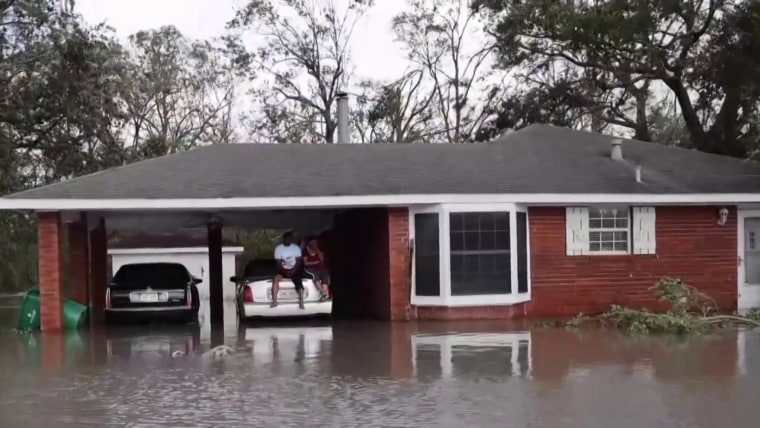Sam Murphy-Butler has left Louisiana only twice, both times to escape hurricanes: Katrina in 2005 and Isaac in 2012.
But Murphy-Butler, a student at the University of New Orleans, decided to stay put for Hurricane Ida. The expense of evacuating was too great, said Murphy-Butler, who uses they/them pronouns.
"I don't have a lot of expendable money," said Murphy-Butler, 21, who stayed to care for animals at Jefferson Feed, Pet and Garden Center, where they make $12,000 to $14,000 as a manager. "I should not have [stayed], but I didn't really have a choice. I couldn't really afford to drop everything and go."
Murphy-Butler is one of many Louisiana residents who found themselves stuck in south Louisiana with limited access to water, food and communications — and with no power in the stifling heat — after Ida tore through the region Sunday.
The few grocery stores and gas stations that have managed to open have blocks-long lines. Cellphone service is spotty. And the city of New Orleans is operating cooling centers to help people escape the heat and charge their electronic devices.
"This weather is nothing to us normally, when we have air conditioning. But we don't have air conditioning, so it's not fine," Murphy-Butler said Tuesday, when the heat index was over 100 degrees.
"Everybody is just drenched in sweat," they said.
More than 1 million customers in Louisiana and Mississippi lost power after Ida toppled power lines and knocked out electricity to all eight transmission lines that feed the New Orleans area.
Jason Dove, 56, who lives in Jefferson Parish, is using a generator to power the home he shares with his wife and her two children, ages 14 and 20. The family and their home — except for a vinyl fence — were unharmed.
But that hasn't meant an easy time.
Dove said he and his wife, Shannon, visited 30 or 40 gas stations in Louisiana unsuccessfully Tuesday.
"My wife counted one line that had 120 cars in it," said Dove, a clinical pharmacist, who stayed in town because of work and so as not to disrupt his 80-year-old father with a long car ride out of town.
Dove and his wife eventually traveled to Mississippi, where they were able to find gas in abundance at the first exit, in Picayune, about 45 miles from New Orleans.
The gas lines in New Orleans were so long, he said, that a two-hour drive to Picayune "was a lot better of a deal" because the area didn't sustain as much damage as Louisiana did and it has a denser population of gas stations. The lines weren't as long, and they moved more quickly, he said.
"It actually saved gas, because if you sit in a car and idle for four hours, you'd use more gas than driving two hours," Dove said.
Katherine Hill, 21, also rode out the storm with her family.
Hill's parents' home in Harahan, a New Orleans suburb, lost power before Ida even fully came ashore. They relied on a satellite television for news reports, while they watched as the windows bent and vibrated and yelled to talk to one another over the howling wind.
But the trouble didn't start until the storm was gone, Hill said — "the next day was when the real horror began."
They had no cellphone service. "We couldn't call to check on family or friends," she said. They also couldn't send texts to reassure loved ones that they were OK.
"And we couldn't even make a plan to escape," Hill said.
The generator they'd been using to power fans and the satellite television was running out of gas, and the house was getting hotter by the second, Hill said.
She and her parents had no water pressure, and they learned from news reports that a boil water advisory had been issued for their area, which meant they had to boil tap water before consuming it or using it to wash the dishes or brush their teeth.
"We had limited bottled drinking water," Hill said. "We were in the dark, literally."
Neighbors shared as many of their resources as they could spare, because no stores were open and gas stations were down.
"It felt like the apocalypse, and we were desperate," Hill said.
She and her parents traveled all day Tuesday to Atlanta to stay with a family friend who offered to take them in.
By Wednesday, Murphy-Butler had also decided to leave after having spent the night at home without power or air conditioning.
They loaded clothing and toiletries to last a few days; their cat, Bishop, and his litter box; and enough supplies for them both — cat litter, two cases of water and food — into their 2000 Toyota Corolla.
Then they waited in a long line to fill up at a gas station, hopeful they could make it to Lafayette to stay with a friend.
"This car ain't built for that, but we're powering through," Murphy-Butler said.
"wait" - Google News
September 02, 2021 at 05:51AM
https://ift.tt/3mQNiFX
Louisiana residents who didn't evacuate wait for power, water, communication to be restored - NBC News
"wait" - Google News
https://ift.tt/35qAU4J
https://ift.tt/2Ssyayj
Bagikan Berita Ini















0 Response to "Louisiana residents who didn't evacuate wait for power, water, communication to be restored - NBC News"
Post a Comment